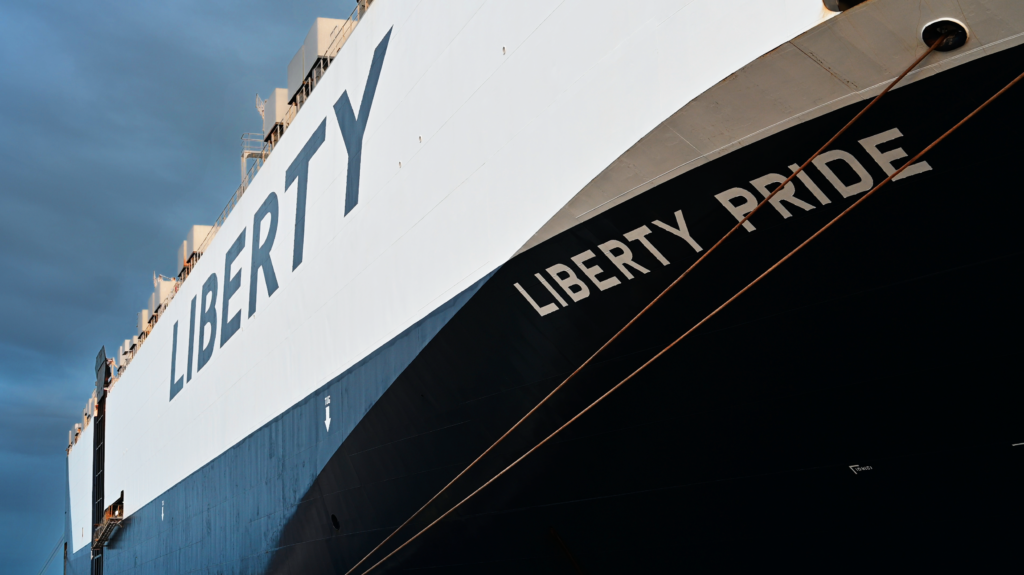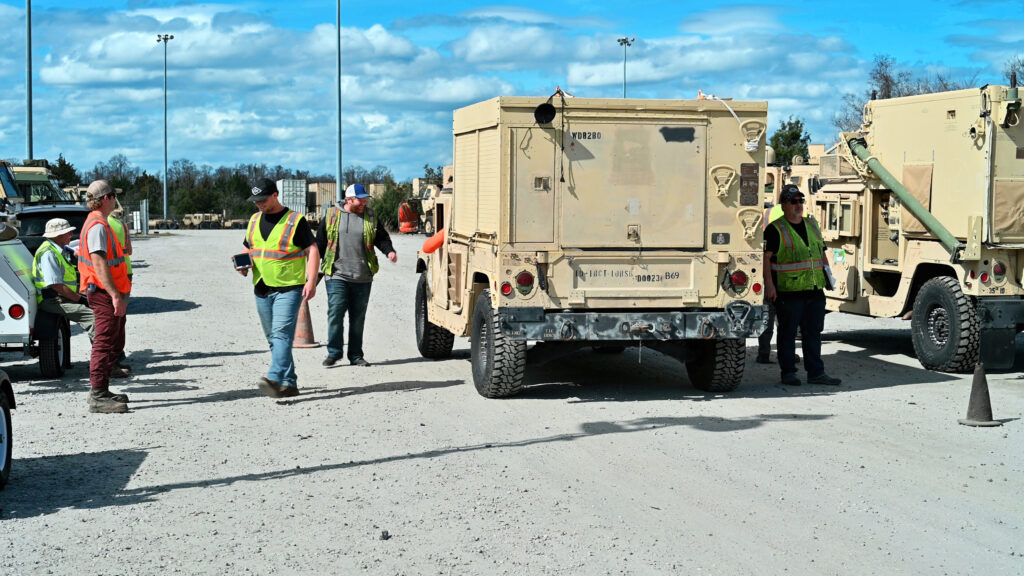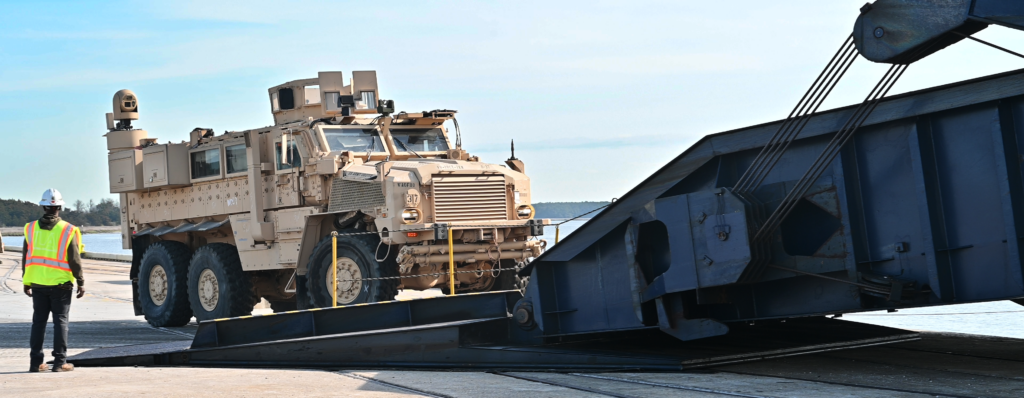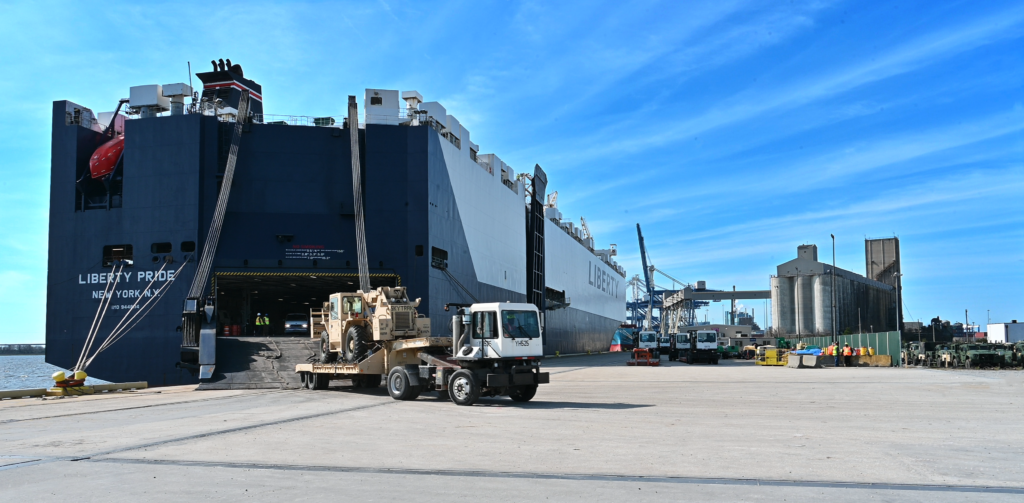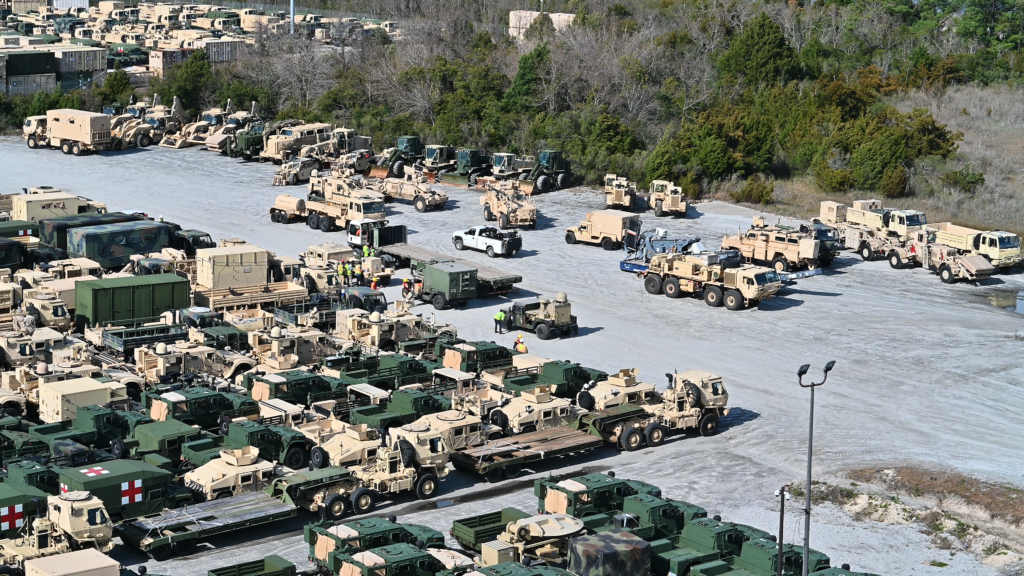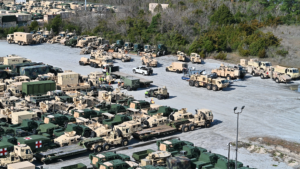The labor force of choice to get the job done.
The ILA is the labor force of choice to support movement by sea of America’s Military.
As the only trained and ready workforce with the skills and experience to meed DoD requirements, longshoremen are DoD’s unique, reliable and indispensable force of choice.
Supporting the Department of Defense
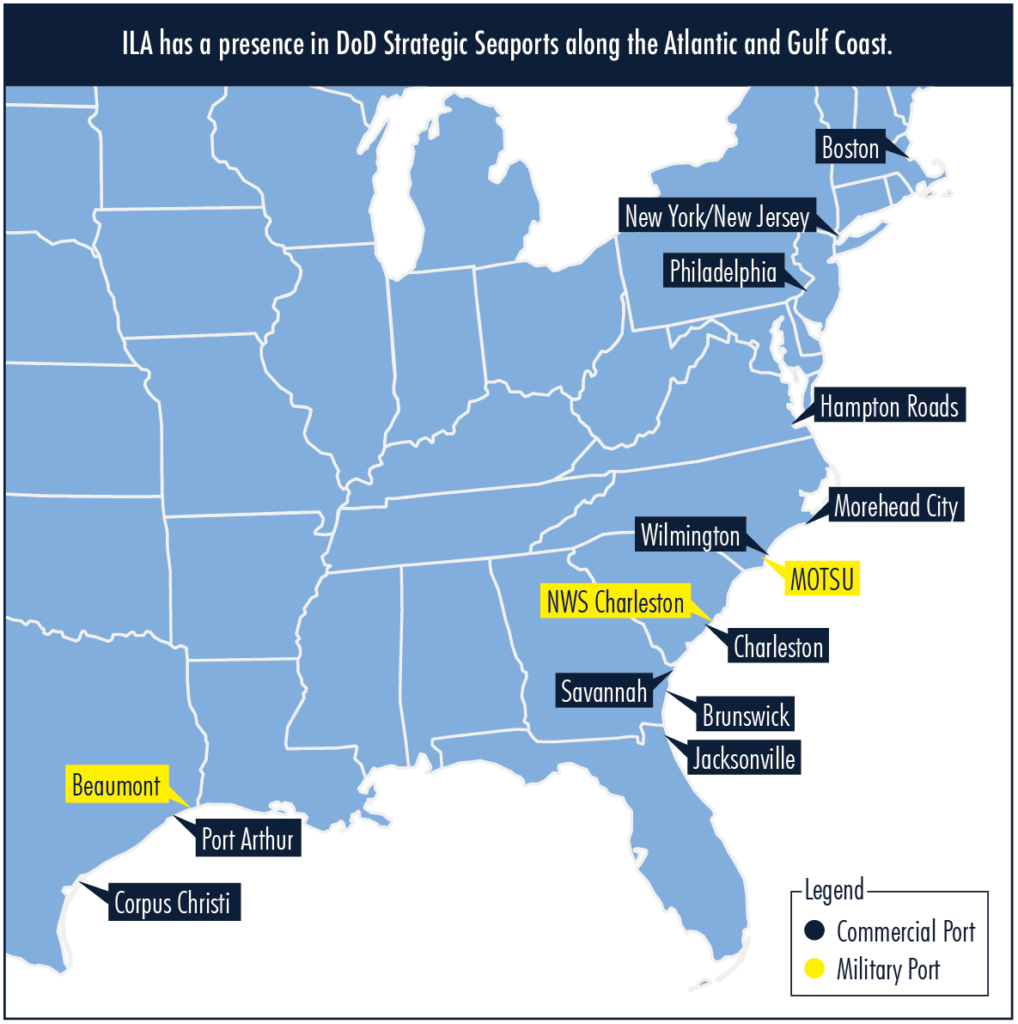
Strategic locations.
In our busiest and largest region, the ILA has 80,000 members working at 38 ports along the Atlantic and Gulf Coasts. Moreover, the ILA operates in all our nationally important strategic seaports in this region. The military rapid reaction forces within the XVIIIth Airborne Corps at Fort Liberty and Marine Corps Base Camp LeJeune, based in North Carolina, Fort Stewart, Georgia, Fort Campbell, Kentucky, and Fort Cavazos and Fort Bliss, Texas all rely on strategic ports in our District to deploy on short notice. Military Ocean Terminal Sunny Point is the single most important military point for hazardous cargo and ammunition on the east coast and Longshoremen stand watch to make sure operations run smoothly. Consequently, our Longshoremen must always be ready to transition to support projecting military forces.
DoD’s force of choice.
Longshoremen are a trusted, valued, and supportive DoD partner. We recognize and appreciate the critical role DoD serves in protecting national security and the rights we enjoy as citizens of this great nation. Interestingly, many Longshoremen have military combat experience and understand first-hand the crucial role of our military. Our patriotism, experience, and commitment translate into unsurpassed dedication and attention to detail, urgency of mission, and unparalleled professionalism. We consider it an honor to support DoD and its mission. Complementing our dedication and commitment to DoD’s mission, we offer capabilities, experience, and expertise that surpass our competitors. We offer a highly experienced, dependable, agile, readily deployable workforce in all DoD strategic seaports along the Atlantic and Gulf Coast.
Specialists in handling military cargo.
Handling military cargo – vehicles, aircraft, and containers – is unique and requires special skills. Specifically, operating the myriad wheeled and tracked vehicles in the DoD inventory requires familiarity and experience on highly specialized combat and combat support vehicles and the many trailers and shelters to which they are connected. For example, Abrams tanks, Stryker vehicles, Joint Light Tactical Vehicles (JLTVs), Rough Terrain Container Handling Vehicles (RTCH), Heavy Expanded Mobility Tactical Trucks (HEMTT), Engineer Mine Clearing Vehicles, Mine-Resistant Ambush Protected (MRAP) vehicles, Bradley fighting vehicles, and the many variants within these families of vehicles, including the trailers they tow, with many more possible types of vehicles, are incredibly complex. Special skills are required to facilitate loading and unloading of the vehicles, hazardous cargo, and ammunition onto military roll-on and roll-off ships and other vessels contracted to support the military. Operating these vehicles day and night, often in adverse weather conditions, requires special operator skills unique to Longshoremen. When timely loading of military equipment is paramount, Longshoremen are the force of choice to get the mission done safely and on time.
Short-notice surge capacity.
The dangerous 21st Century security environment in which we live requires short-notice surge capacity that only Longshoremen can provide. During the surge of Desert Shield and Desert Storm, Longshoremen deployed on short notice throughout the US to augment and support Longshoremen organic to the specific Port that the military had selected to deploy Army and US Marine Corps combat formations. The Longshoremen operated continuously to meet tight timelines to load military cargo as quickly as possible onto fast sealift ships so they could speed to the Persian Gulf, enabling the military to project power quickly. Arguably, only Longshoremen have the capacity to move trained-and-ready workers on short notice to the many Ports that DoD may need to outload in an emergency. The increased terrorist threats and challenging force protection necessary to secure our nation’s critical Ports and Terminals are an important consideration in contingency planning. Only Longshoremen have the capacity and experience to rapidly deploy to a contingency Port due to a terrorist threat closing a primary strategic seaport. The nation’s security depends upon the ILA to support military outload operations.
Charleston and Sunny Point.
Charleston Harbor is the deepest harbor on the East Coast at 52 feet. As such, it is DoD’s most strategic and busiest terminal for shipping military equipment. Sunny Point is the single most critical location on the east coast from which DoD outloads hazardous material and ammunition by sea. At both these locations, DoD and Portus Terminals LLC routinely select the ILA as their clear choice for their most critical missions at Charleston’s Naval Weapons Station and the U.S. Army’s Military Ocean Terminal Sunny Point. Longshoremen capacity at Jacksonville and Beaumont, Texas is equally impressive and stands ready to support short-notice DoD requirements.
Highly trained and experienced.
Longshoremen are among the best-trained, safest, and most reliable source of labor available anywhere. The typical Longshoremen has an average of 10-15 years of work experience with appropriate supervision, training, and certification at every stage of their development. Supervisors and foremen average 15 to 30 years of full-time experience. Moreover, Longshoremen are professionals who complete annual safety courses, hands-on training, and applicable certifications as required by Occupational Safety and Health Administration and local port requirements. Longshoremen also strictly adhere to drug and alcohol screening. During the recent pandemic their compliance with public health requirements was unprecedented and ensured our east and gulf coast ports and terminals operated smoothly.
Excellent safety record.
Because of these stringent training requirements and strong emphasis on employee care and protection, Longshoremen have an excellent safety record that is well above industry standards. Moreover, they automate training and important certification skills on their websites and on their mobile application or “apps” they offer Longshoremen a digital tool to help their men and women remain up-to-date and current in their skills. Leadership of Longshoremen from National, Regional, and local levels are committed to ensuring the correct certification and apprenticeship programs to keep their people safe, limit damage, and ensure their organizations are run fairly with opportunity for everyone — regardless of race, religion, or ethnicity.
